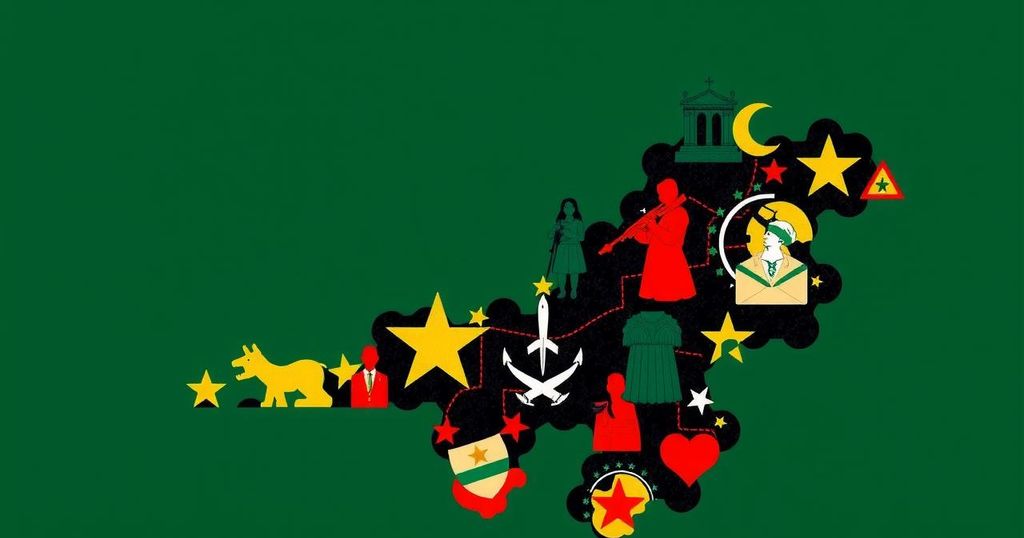Mozambique’s Road from Civil War to Political Turmoil

Mozambique’s political history is characterized by the turbulent relations between Frelimo and Renamo, leading to a long civil war that concluded with the 1992 peace accords. Attempts at developing political democracy have been marred by economic challenges, natural disasters, and allegations of electoral fraud, particularly preceding the upcoming 2024 elections, where the stability of the nation is once again at stake. Recent peace agreements have aimed to reduce tensions, yet significant challenges remain.
The civil unrest in Mozambique, primarily marked by the conflict between the ruling party Frelimo and the opposition group Renamo, has seen a series of significant developments since the early 1990s. The transition towards multiparty democracy began with the 1994 elections that followed decades of civil war, ultimately culminating in political reforms and a tentative peace. Frelimo, adapting its political stance, allowed for multiparty elections after previously maintaining a socialist identity, while Renamo transformed itself into a recognized political party. By the mid-1990s, various economic reforms were introduced, although challenges persisted from the war’s aftermath, including widespread landmines and economic hardships.
In the early 21st century, Mozambique garnered attention due to natural disasters that compounded economic difficulties. Nevertheless, the discovery of coal and natural gas created opportunities for growth, further complicated by political dynamics and shifts in leadership. The elections of 2014, under Filipe Nyusi, allowed Frelimo to maintain dominance but revealed cracks in their support, with Renamo’s grievances intensifying. This led to renewed conflict by 2015, although subsequent peace agreements indicated a willingness to negotiate.
Despite hopes for reconciliation, the political landscape remained fractured, particularly following Dhlakama’s death in 2018. Leadership under Ossufo Momade continued talks with Nyusi, producing agreements aimed at lasting peace. However, Mozambique’s economy faltered in 2016, exacerbated by undisclosed debts, suspending international aid and resulting in further unrest.
Natural disasters, particularly devastating cyclones in 2019, further strained the nation’s infrastructure, yet a semblance of stability appeared during that election cycle. Nonetheless, allegations of electoral malfeasance marred the subsequent elections. These events set the stage for discontent leading up to the 2024 elections, where Frelimo’s Daniel Chapo is anticipated to face renewed opposition amid allegations of electoral irregularities, creating an atmosphere of tension and uncertainty in Mozambique.
Mozambique’s history of civil strife has been shaped by the ideological battle between Frelimo and Renamo, both parties emerging from different backgrounds and philosophies. Frelimo, formed during the independence struggle, embraced Marxism-Leninism, whereas Renamo, initially considered a rebel faction during the civil war, sought to overhaul its image to gain political legitimacy. The signing of the Rome peace accords in 1992 marked a significant pivot towards multiparty democracy, setting the stage for crucial reforms in the political landscape. Since then, Mozambique has experienced both phases of growth and setbacks due to political instability, economic challenges, and natural disasters. Understanding the motivations of the current political actors and the historical context is vital for comprehending ongoing developments.
In summary, Mozambique’s journey through civil war to a tentative peace underscores the complexities of its political landscape. The interactions between Frelimo and Renamo remain pivotal, especially as the nation approaches the 2024 elections. Economic challenges, coupled with the lingering shadow of past conflicts and recent accusations of electoral fraud, present significant hurdles for future stability and democratic governance. The path forward necessitates genuine reconciliation and a commitment to overcoming historical divisions for the benefit of all Mozambicans.
Original Source: www.britannica.com







